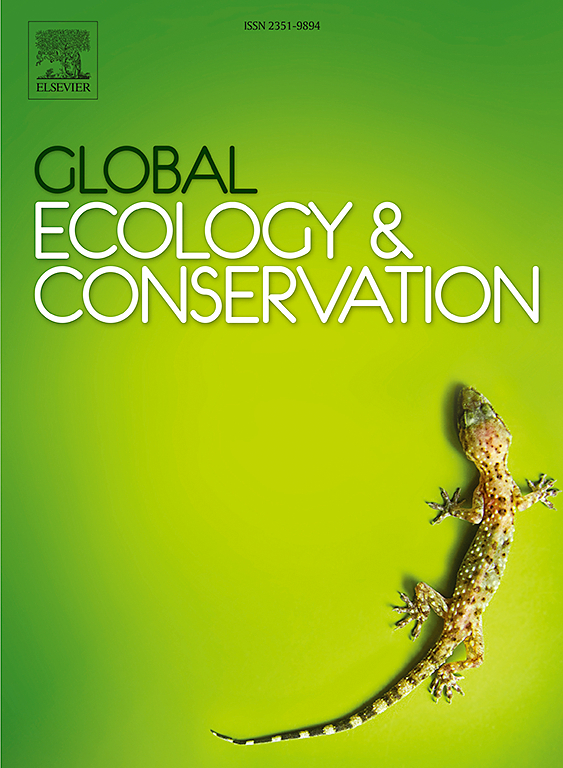Fishway assessment and monitoring for endemic migratory fish using multiple techniques in high-altitude river systems: A case study from the Yarlung Zangbo River, Southeastern Tibetan Plateau
IF 3.5
2区 环境科学与生态学
Q1 BIODIVERSITY CONSERVATION
引用次数: 0
Abstract
The Yarlung Zangbo River (YZR) on the Tibetan Plateau is a prime hotspot for hydropower development in China, yet this inevitably poses risks to river connectivity and the survival of its unique endemic fish species. Fishway installations are often adopted to mitigate the impacts on fish, but their effectiveness especially in high-altitude regions remains inadequately studied. Our study offers the first comprehensive evaluation of a fishway installed on a primary tributary of the YZR from 2019 to 2021, using multiple methods including fish sampling, video monitoring, hydroacoustic detection, and passive integrated transponder telemetry technology. The below-dam fish community was dominated by cold-water rheophilic Schizopygopsinae, Schizothoracinae, and Nemacheilidae. Fish movements exhibited distinct seasonal and diel patterns, with activity rising in April and peaking in May. Approximately 75.0 % of fish movements within the fishway were recorded during daytime (7:00–19:00), whereas the fish assemblage near the fishway entrance primarily occurred during nighttime (20:00–6:00). Telemetric trials on five endemic species revealed upstream- and downstream passage efficiencies of 31.0 % and 61.7 %, respectively. Passage efficiency, transit time, and speed varied substantially among species and individuals, primarily affected by environmental factors such as fishway discharge and water temperature. Our findings provide the essential information on fish behavior and movement patterns for designing more effective fishways in plateau regions and underscore the importance of continuous monitoring and evaluation to optimize fishway performance, ensuring that the conservation of endemic fish species is achieved successfully amid expanding hydropower development in the region.
利用多种技术评估和监测高海拔河流系统中特有洄游鱼类的鱼道:青藏高原东南部雅鲁藏布江案例研究
青藏高原上的雅鲁藏布江(YZR)是中国水电开发的主要热点地区,但这不可避免地会对河流的连通性及其特有鱼类的生存带来风险。为减轻对鱼类的影响,通常会采用鱼道设施,但对其有效性,尤其是在高海拔地区的有效性,研究仍显不足。我们的研究采用多种方法,包括鱼类采样、视频监控、水声探测和无源集成转发器遥测技术,首次对 2019 年至 2021 年期间在雅鲁藏布江一级支流上安装的鱼道进行了全面评估。坝下鱼类群落主要以冷水嗜流性鱼类 Schizopygopsinae、Schizothoracinae 和 Nemacheilidae 为主。鱼类的活动呈现出明显的季节性和昼夜规律,活动量在四月上升,五月达到高峰。鱼道内约 75.0% 的鱼类活动记录发生在白天(7:00-19:00),而鱼道入口附近的鱼类活动主要发生在夜间(20:00-6:00)。对五种特有鱼类进行的遥测试验显示,上游和下游的通过效率分别为 31.0% 和 61.7%。不同物种和个体的通过效率、通过时间和速度差异很大,主要受鱼道排水量和水温等环境因素的影响。我们的研究结果为在高原地区设计更有效的鱼道提供了有关鱼类行为和运动模式的重要信息,并强调了持续监测和评估以优化鱼道性能的重要性,从而确保在该地区水电开发不断扩大的同时成功保护特有鱼类物种。
本文章由计算机程序翻译,如有差异,请以英文原文为准。
求助全文
约1分钟内获得全文
求助全文
来源期刊

Global Ecology and Conservation
Agricultural and Biological Sciences-Ecology, Evolution, Behavior and Systematics
CiteScore
8.10
自引率
5.00%
发文量
346
审稿时长
83 days
期刊介绍:
Global Ecology and Conservation is a peer-reviewed, open-access journal covering all sub-disciplines of ecological and conservation science: from theory to practice, from molecules to ecosystems, from regional to global. The fields covered include: organismal, population, community, and ecosystem ecology; physiological, evolutionary, and behavioral ecology; and conservation science.
 求助内容:
求助内容: 应助结果提醒方式:
应助结果提醒方式:


